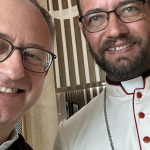- Feb 5, 2002
- 166,616
- 56,251
- Country
- United States
- Faith
- Catholic
- Marital Status
- Married
- Politics
- US-Others
There is only one continent on which Catholicism is not retreating, but expanding: Africa. Five of the ten countries with the highest Mass attendance rates are African. The only seminaries filling up instead of emptying are African.
And also from Africa comes the resistance against the current that is driving so many Catholic Churches in the North toward the shores of blessing homosexual couples. In the Anglican Church on this same question it has already come to schism, and there too the numbers are all in the South’s favor.
In short, it is not wrong to see in Africa the future axis of Christianity worldwide. The synod to be held in Rome in October, convened by Pope Francis, will be a proving ground for this pivot.
But there is also something else in African Catholicism. And it is anything but radiant. It is the opposition, which often becomes armed warfare, among the tribes.
Francis got firsthand experience of this when he went to Congo and South Sudan last February. And he has repeatedly felt its destructive repercussions when his episcopal appointments in Africa have been rejected by enemy tribes, with disputes that have lasted for years and have not always been resolved, with bloody aftermath. Settimo Cielo published a striking synopsis of these last March 6.
During the press conference on the plane back from Juba, Francis did not hesitate to call tribalism “diabolical,” while admitting that he doesn’t “quite know how it is.” But if he has read the latest copy of “La Civiltà Cattolica” – which, as always, he was given to thumb through in advance – these doubts of his should have disappeared.
In its June 3-17 issue, “La Civiltà Cattolica” has published an extensive conversation (see photo) between its editor, Antonio Spadaro, and the bishop of Rumbek, Christian Carlassare, who precisely on account of tribal enmities fell victim, after his appointment in 2021, to an armed ambush by a priest and four laymen of the diocese.
With 12 million inhabitants, South Sudan is almost two-thirds Christian and escaped the domination of the Muslim North, with its capital Khartoum, after more than twenty years of war. But as soon as it reached independence in 2011, irreparable divisions sprang up among the 64 ethnic groups present in the country, each with its own language and traditions, and above all between the two major tribes, the Dinka and the Nuer.
But let’s hear from Bishop Carlassare:
Continued below.

 magister.blogautore.espresso.repubblica.it
magister.blogautore.espresso.repubblica.it
And also from Africa comes the resistance against the current that is driving so many Catholic Churches in the North toward the shores of blessing homosexual couples. In the Anglican Church on this same question it has already come to schism, and there too the numbers are all in the South’s favor.
In short, it is not wrong to see in Africa the future axis of Christianity worldwide. The synod to be held in Rome in October, convened by Pope Francis, will be a proving ground for this pivot.
But there is also something else in African Catholicism. And it is anything but radiant. It is the opposition, which often becomes armed warfare, among the tribes.
Francis got firsthand experience of this when he went to Congo and South Sudan last February. And he has repeatedly felt its destructive repercussions when his episcopal appointments in Africa have been rejected by enemy tribes, with disputes that have lasted for years and have not always been resolved, with bloody aftermath. Settimo Cielo published a striking synopsis of these last March 6.
During the press conference on the plane back from Juba, Francis did not hesitate to call tribalism “diabolical,” while admitting that he doesn’t “quite know how it is.” But if he has read the latest copy of “La Civiltà Cattolica” – which, as always, he was given to thumb through in advance – these doubts of his should have disappeared.
In its June 3-17 issue, “La Civiltà Cattolica” has published an extensive conversation (see photo) between its editor, Antonio Spadaro, and the bishop of Rumbek, Christian Carlassare, who precisely on account of tribal enmities fell victim, after his appointment in 2021, to an armed ambush by a priest and four laymen of the diocese.
With 12 million inhabitants, South Sudan is almost two-thirds Christian and escaped the domination of the Muslim North, with its capital Khartoum, after more than twenty years of war. But as soon as it reached independence in 2011, irreparable divisions sprang up among the 64 ethnic groups present in the country, each with its own language and traditions, and above all between the two major tribes, the Dinka and the Nuer.
But let’s hear from Bishop Carlassare:
Continued below.

The Future of the Church Is in Africa, Which However Brings a Dowry of Tribal Wars
> Italiano > English > Español > Français > All the articles of Settimo Cielo in English If you want to receive (or go back to receiving) a notification for every new article, click HERE and subscribe to the Newsletter from
